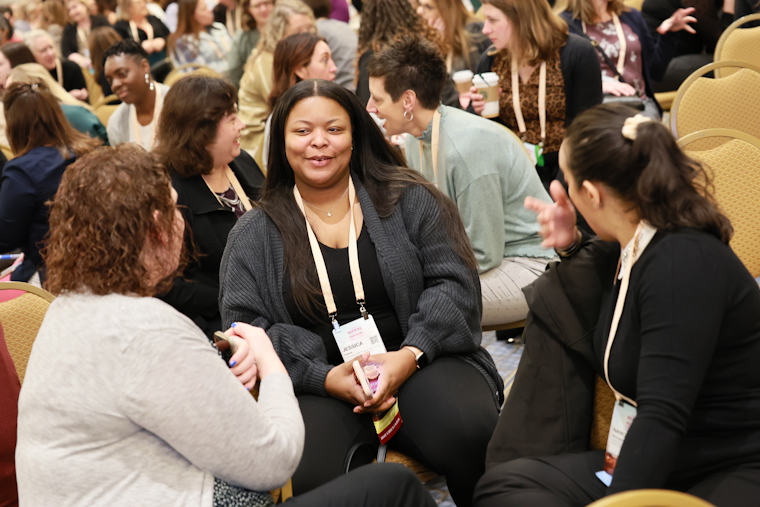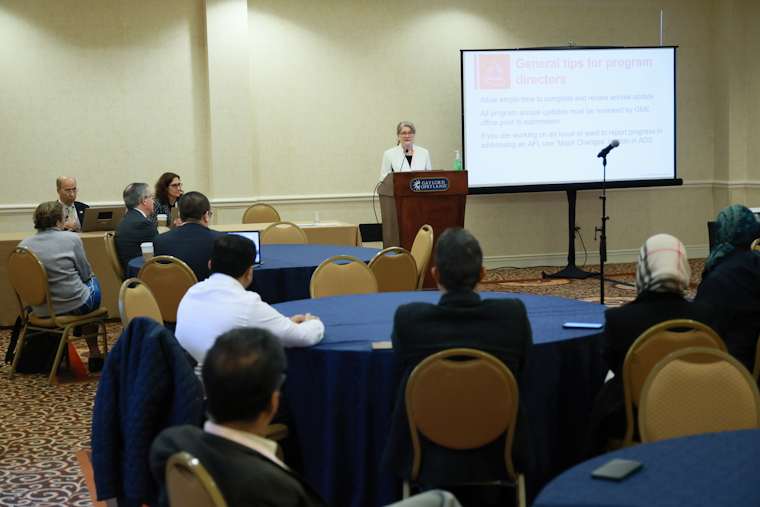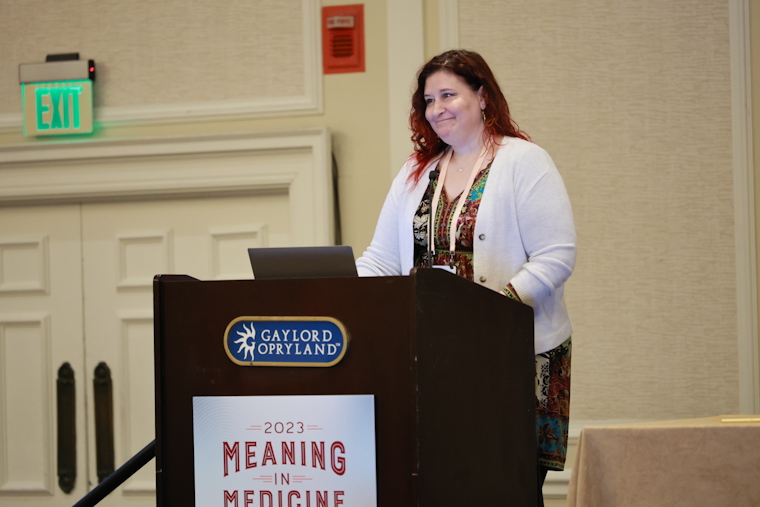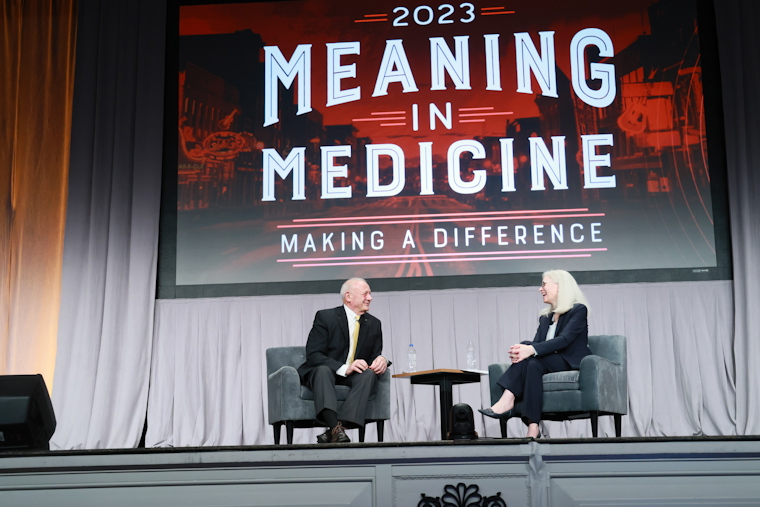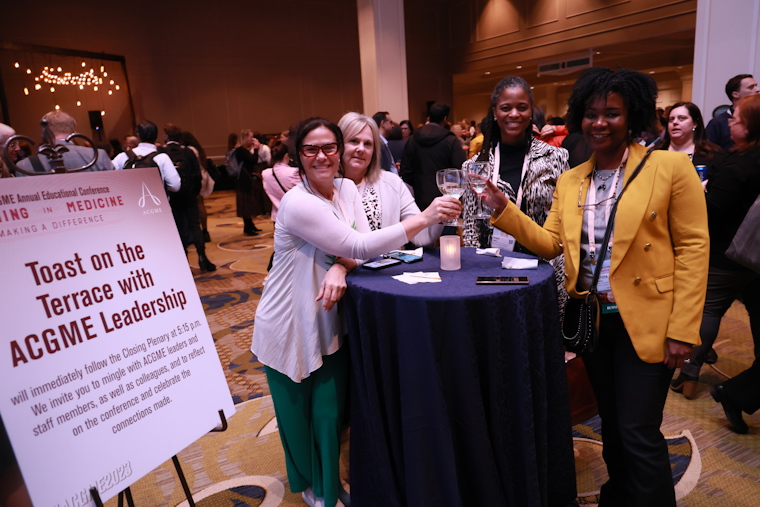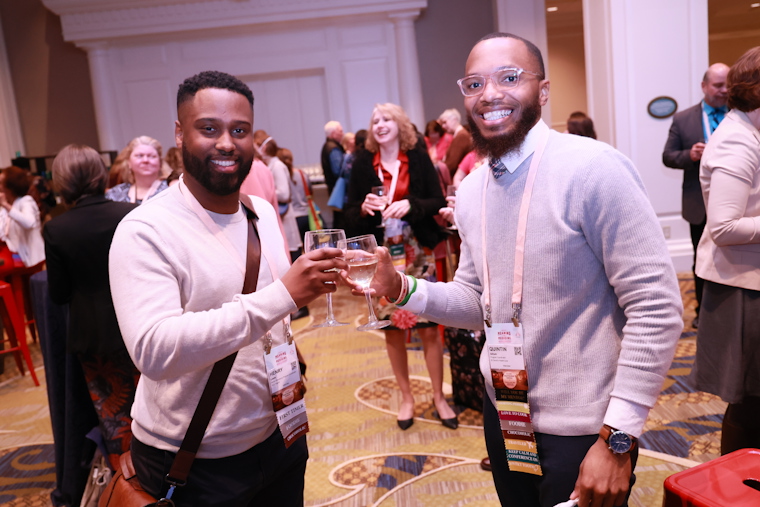The third and final day of the 2023 ACGME Annual Educational Conference was bookended by important plenaries – a Coordinator Plenary, the Marvin R. Dunn Keynote Address, and Closing Plenary. Educational sessions and last chances to honor connections new and reignited peppered the rest of the day, which was capped off with a “Toast on the Terrace” reception to celebrate the conclusion of what turned out to be an incredibly successful in-person event for the organization and graduate medical education (GME) community.
Well-Being Satisfiers, Stressors, and Finding a Path Forward
Before the Keynote Address, a Coordinator Plenary was held in the morning. In the fall of 2022, the ACGME conducted a first-ever well-being survey of coordinators to assess the mental health and well-being of coordinators and identify positives and challenges in their professional lives. In an enthusiastic, capacity-only presentation, a panel that included Aurea Baez-Martinez, BA, MS, C-TAGME; Pamela Carpenter, MEd; ACGME Vice President, Well-Being Stuart Slavin, MD, MEd; and ACGME Director, Resident Experience, Well-Being, and Milestones Research Nicholas Yaghmour, MPP presented the survey results. Attendees then paired off for individual discussions on their reactions to the survey, and then shared the results of those discussions with the group.
International Representation
Day three also featured several international-themed sessions, bringing attendees from around the world and those interested in global GME together. Both ACGME International (ACGME-I) – the independent organization that accredits exclusively outside of the US – and ACGME Global Services, the ACGME department that provides advisory and consultative services to advance GME around the world, contributed to the educational opportunities for attendees.
ACGME Global Services collated, processed, and analyzed survey results from global thought leaders and discussed moving GME forward for a future, more globally connected GME community.
ACGME International presented two sessions. In the first, the Chairs of both Review Committees-International, Sophia Archuleta, MD and Salahddin Gehani, MBBCh, MSc, FRCS, elaborated on the detailed workings of the committees and offered useful tips for communicating concerns, details, and improvements to the Review Committees. ACGME-I President and CEO James Arrighi, MD discussed new initiatives, especially to place ACGME-I as the convenor of increasingly cooperative and connected global GME community. In its second session, ACGME-I explored how to advance innovation and research in international GME, with speakers discussing the importance of collaborative research.
Healing from Trauma: Impacts on the Health Care Community
In a moving and powerful Marvin R. Dunn Keynote, ACGME Chief Accreditation Officer Lynne M. Kirk, MD, MACP spoke with Theodore Corbin, MD, MPP, professor and chairperson for the Department of Emergency Medicine at Rush University Medical Center, and Selwyn Rogers Jr., MD, MPH, FACS, section chief of Trauma and Acute Care Surgery at the University of Chicago Medicine about the traumatic effects of violence on victims, their families, and their communities, as well as on the dedicated health care professionals who manage and treat their injuries. The session began with a video, shared with permission from Dr. Corbin and one of his patients. In the video, the patient, a young Black man, tells of his personal experience with gun violence, starting with the first time he saw someone shot – on a basketball court in a park in his neighborhood when he was 12. He proceeds to talk about the continuing presence of gun violence in his life, including being shot himself three times, and the traumatic impact it has had, turning him from an innocent boy who never imagined this reality, to a man struggling with his feelings of revenge. Drs. Corbin and Rogers then addressed several important and provocative questions on how their paths led each of them to this work; on their experience with the effects exposure to such violence has on patients, their families, and their communities; on how they manage the effects of treating trauma victims on their own well-being; on what physician educators should know to both teach and support their learners with regard to experiencing repeated exposure to trauma; on what the ACGME and other key organizations in the medical education continuum can do to make a difference; and more.
“We’re all here for a reason, and that is to see things change,” Dr. Corbin said in his closing comments.
Dr. Rogers echoed that sentiment as well, paraphrasing Margaret Mead to leave the audience inspired and motivated: “Never doubt that committed people working together can change the world. In fact, it’s the only thing that ever has.”
A Conversation on the Future of Graduate Medical Education
The final session of the conference discussed the future of GME, as Debra Weinstein, MD, executive vice dean for Academic Affairs, professor, and chief academic officer at University of Michigan Medical School and Michigan Medicine, interviewed Thomas J. Nasca, MD, MACP, president and chief executive officer of the ACGME.
After reflecting on the “quality assurance” role of the ACGME and its primary function as a convener of experts in GME, Dr. Nasca turned to the opportunity in the future to elevate and improve education and training by “minimizing the pressure on [the GME community] by maximizing the opportunities.” He discussed the stress put on faculty members in recent years; the importance of diversity, equity, and inclusion as values to be lived rather than goals that can be achieved; and maintaining the trust of the public by the ACGME doing what it says it will do.
Two of the topics Drs. Nasca and Weinstein spent the most time examining were the GME pipeline and data warehousing. Asked if we could expect a unified GME data structure in our lifetime, Dr. Nasca was optimistic, noting that the landscape is changing from local data centers to shared cloud functioning. Still, he acknowledged the challenges with the current status of siloed educators. Similarly, regarding the tightening pipeline as medical school positions have outpaced those in GME, Dr. Nasca emphasized his deep concern for faculty members, as their protected time evaporates, and the baby boomer generation of physicians retires. “We can’t escape the fact that we are hemorrhaging nurses and other caregivers and we are certainly losing doctors,” he said. He made clear that while the ACGME does not have a role and therefore is limited in how it can impact the pipeline into medical school, the organization has made strides to increase opportunities for residents, such as the Rural Track Program designation, and it is important that “everyone who is capable of having a residency program, [has] a residency program.”
Save the Date for #ACGME2024
Finishing off with a celebratory toast, the sense that coming back together in person was energizing the community was palpable. As attendees and ACGME staff members and leaders return to their own programs, institutions, and home offices, the lessons learned and connections built and reinforced will certainly provide much fodder for change, innovation, and evolution in both the short- and long-term future of GME.
The ACGME thanks all who contributed to, supported, and attended the conference. We hope we’ll see you all next year at the 2024 Annual Educational Conference, scheduled for March 7-10 in Orlando Florida. In fact, as you reflect on this conference and look forward, let us know what topics you’d like to see addressed in educational sessions next year by responding to the Call for Topics, open now through March 20, 2023.

